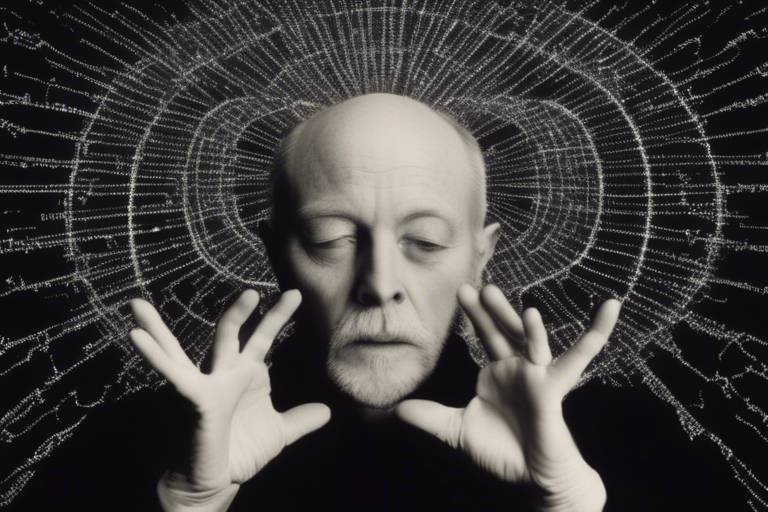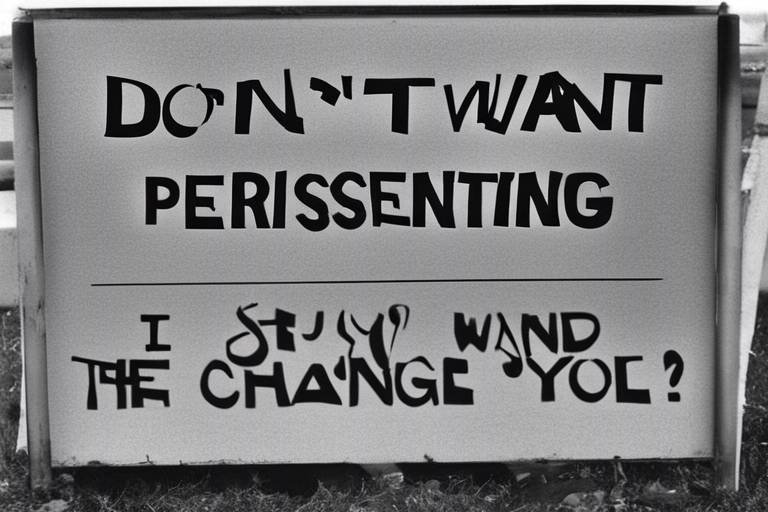Is Ontology Central to Understanding Subject and Object?
The exploration of ontology is like peeling back the layers of an onion; each layer reveals deeper insights into the very fabric of reality. At its core, ontology investigates the nature of being and existence, asking fundamental questions about what it means to exist. This philosophical inquiry is not just an abstract exercise; it has profound implications for how we understand the concepts of subject and object. These two terms are not merely academic jargon; they are central to our perception of reality and our interactions within it.
Imagine walking through a bustling market. As a subject, you perceive various objects—the vibrant fruits, the colorful fabrics, the chatter of vendors. Your experience is shaped by your perspective, which is a product of your unique background, emotions, and thoughts. This interplay between subject and object is where ontology shines a light, revealing how our understanding of existence is deeply intertwined with our perceptions and interactions.
In philosophical discussions, the subject is often viewed as the thinker or the perceiver, while the object represents the external world that the subject interacts with. However, this relationship is not one-sided; it is a dynamic dance where each influences the other. By delving into ontology, we can uncover the underlying principles that govern this relationship, providing clarity on how knowledge is constructed and understood.
Moreover, the significance of ontology extends beyond philosophical discourse. In fields such as psychology, cognitive science, and even artificial intelligence, understanding the subject-object relationship is crucial for grasping how we interpret reality. For instance, when developing AI systems, programmers must consider how machines perceive and interact with their environment—essentially, how they understand the distinction between subjectivity and objectivity.
In summary, ontology is not just an academic pursuit; it is central to our comprehension of the world around us. By examining the relationship between subject and object through an ontological lens, we can gain valuable insights into the nature of reality, knowledge, and perception. This exploration invites us to question our assumptions and encourages a deeper understanding of the complexities that define our existence.
- What is ontology?
Ontology is a branch of metaphysics that studies the nature of being, existence, and the categories of being. - How do subject and object relate to ontology?
The concepts of subject (the perceiver) and object (the perceived) are central to understanding existence and are deeply analyzed within ontological studies. - Why is understanding the subject-object relationship important?
This understanding influences how we perceive reality, construct knowledge, and interact with the world and others. - Can ontology impact fields outside philosophy?
Yes, ontology plays a critical role in various fields, including psychology, cognitive science, and artificial intelligence.

The Basics of Ontology
Ontology, as a branch of metaphysics, delves deep into the very essence of existence and the nature of being. Imagine standing at the edge of a vast ocean, gazing at the horizon where the sky meets the water. This ocean represents the complex and intricate web of existence, and ontology is like your boat, helping you navigate through its depths. Understanding ontology is crucial because it lays the groundwork for exploring the relationship between subjects and objects in philosophical thought.
At its core, ontology asks fundamental questions such as: What exists? What does it mean to exist? How do we categorize different entities? These inquiries are not merely academic; they resonate deeply with our everyday experiences and perceptions. For instance, consider how we categorize things in our lives. We don't just see a tree; we recognize it as a living organism, a part of nature, and even a source of oxygen. This categorization is an ontological act, as it reflects our understanding of the tree's existence and its relationship to the world around it.
Ontology is often divided into various branches, each focusing on different aspects of existence. Some of the key areas include:
- Metaphysical Ontology: This focuses on the fundamental categories of being and their relationships.
- Social Ontology: This examines the nature and properties of social entities, like groups and institutions.
- Formal Ontology: This involves the study of the abstract structures that underpin various domains of reality.
Understanding these branches is essential for grasping how ontology influences our perception of reality. It helps us see that what we consider "real" is often shaped by our interpretations and frameworks. Just as a painter uses different colors and techniques to create a masterpiece, our understanding of existence is painted by the ontological frameworks we adopt.
Moreover, ontology is not a static field; it evolves as our understanding of the world changes. The advent of technology, for instance, has introduced new entities and relationships that challenge traditional ontological categories. Think about digital entities like social media profiles or virtual reality avatars. They force us to reconsider what it means to "exist" in a digital age. This fluidity in ontology reflects the dynamic nature of our reality, making it a vital area of study for philosophers and thinkers alike.
In conclusion, ontology serves as the backbone of philosophical inquiry, providing the tools necessary to dissect the complex interplay between subjects and objects. By understanding its foundational concepts, we can better navigate the philosophical landscape and engage in meaningful discussions about existence, knowledge, and reality.

Subject and Object Defined
In philosophy, the terms subject and object are pivotal, serving as the cornerstone of many discussions regarding perception and reality. At its core, the subject refers to the entity that perceives, thinks, or experiences. This is often an individual, a conscious being who interprets the world around them. On the flip side, the object represents what is perceived, thought about, or experienced; it is the entity that exists independently of the subject's consciousness. Think of it this way: if the subject is like the artist, the object is the canvas upon which the artist creates. Without the canvas, the artist has nothing to express.
To further clarify, let’s break down these concepts:
| Term | Definition |
|---|---|
| Subject | The perceiving entity, often associated with consciousness and thought. |
| Object | The entity that is perceived or acted upon, existing independently of the subject. |
The interaction between subjects and objects is dynamic and multifaceted. For instance, when a subject observes an object, they do not merely register its existence; they interpret it through their own lens of experience and understanding. This interaction raises intriguing questions: Can we ever truly know an object as it is, or are we forever limited by our subjective experience? This interplay is where ontology becomes essential. It provides a framework for understanding how subjects and objects coexist and influence each other.
Moreover, different philosophical frameworks approach the subject-object relationship in various ways. For example, in idealism, the subject is central, positing that reality is mentally constructed. In contrast, realism emphasizes the object, suggesting that objects exist independently of our perceptions. These differing perspectives illustrate the rich tapestry of thought surrounding ontology and its implications for understanding existence.
Ultimately, grasping the definitions of subject and object is more than just an academic exercise; it’s about engaging with the very nature of our reality. As we navigate through life, we constantly oscillate between being subjects and encountering objects, shaping our understanding of the world in profound ways.

The Role of the Subject
The concept of the subject is pivotal in philosophy, primarily because it embodies the perceiver or thinker. When we talk about the subject, we are referring to the individual who experiences, interprets, and interacts with the world around them. This role is not merely passive; rather, it is dynamic and active, shaping our understanding of reality. Think of the subject as the lens through which we view the universe—each person's perspective adds a unique hue to the colors of existence.
In exploring the role of the subject, we must consider several key characteristics that define it:
- Consciousness: The subject is aware of their thoughts and feelings, which influences how they perceive objects.
- Intentionality: Subjects direct their focus and attention towards certain objects, affecting their understanding and interaction.
- Agency: The subject possesses the ability to make choices and take actions, thus impacting the reality they engage with.
These characteristics underscore the importance of subjectivity in shaping our perceptions. For instance, two individuals can witness the same event but interpret it entirely differently based on their unique backgrounds and experiences. This phenomenon illustrates how the subject's perspective can lead to vastly different understandings of the same object. It's like two artists viewing the same landscape; one might focus on the vibrant colors of the sunset, while the other might be captivated by the shadows cast by the trees.
Moreover, the agency of the subject is crucial in discussions of free will and decision-making. When we make choices, we are not just reacting to external stimuli; we are actively engaging with the world, bringing our desires, beliefs, and intentions into play. This agency creates a complex relationship between the subject and the objects they encounter, as each decision can alter the subject's understanding of reality and, subsequently, their interactions with the world.
In essence, the role of the subject is foundational to our understanding of existence itself. It is through the subject that we engage with knowledge, perception, and reality. The interplay between the subject and the object is not just a philosophical abstraction; it is a lived experience that shapes our daily lives. Just as a painter chooses which colors to use on their canvas, the subject selects which aspects of reality to focus on, thereby creating a unique interpretation of the world around them.

Subjectivity and Perspective
Subjectivity is like the lens through which we view the world; it colors our experiences and shapes our understanding of reality. Each individual perceives the world differently, influenced by personal experiences, beliefs, and emotions. Think about it: when you look at a piece of art, your interpretation is uniquely yours, shaped by your background and feelings at that moment. This personal lens is what makes subjectivity such a powerful concept in philosophy.
When we delve into the nature of objects, it’s essential to recognize that they do not exist in a vacuum. Objects are often defined by their relationships with subjects. For instance, a tree is not just a tree; it can be a source of shade, a climbing challenge for children, or a symbol of life in literature. Each of these interpretations reflects the subject’s perspective and highlights how our understanding of objects is inherently subjective.
Moreover, subjectivity plays a pivotal role in how we communicate and share our experiences with others. When we express our thoughts about an object, we are not merely describing it; we are sharing a part of ourselves. This exchange can lead to enriching discussions, where different perspectives come together, creating a tapestry of understanding. However, it can also lead to misunderstandings, as what seems obvious to one person may be completely alien to another.
To illustrate this further, consider the following points:
- Influence of Culture: Different cultures can lead to vastly different interpretations of the same object. For example, a white flower may symbolize purity in one culture and mourning in another.
- Emotional Resonance: An object can evoke strong emotions based on personal experiences. A childhood toy may bring joy to one person while reminding another of loss.
- Context Matters: The context in which we encounter an object can change our perception. A book read in childhood may be seen as a simple story, but revisiting it as an adult may reveal deeper themes.
This interplay between subjectivity and perspective is crucial for understanding the complexities of human experience. It challenges the notion of an objective reality, suggesting instead that our realities are constructed through our interactions with the world around us. In essence, every subject is a unique storyteller, weaving their narrative based on their perspectives, thereby enriching the collective understanding of existence.
As we explore further, it becomes clear that recognizing the significance of subjectivity is not just an academic exercise. It has profound implications for how we engage with one another and the world. By acknowledging that our perspectives are shaped by our individual experiences, we can foster greater empathy and understanding in our interactions, paving the way for more meaningful connections.
- What is subjectivity? Subjectivity refers to how an individual's personal experiences, feelings, and beliefs shape their perceptions of the world.
- Why is perspective important in philosophy? Perspective is crucial because it influences how we interpret objects and experiences, highlighting that our understanding of reality is often subjective.
- How does culture affect our perspective? Culture shapes our values, beliefs, and interpretations, which can lead to diverse understandings of the same object or experience.

Agency of the Subject
The agency of the subject is a fascinating concept that delves into the ability of individuals to act, make choices, and influence their surroundings. In philosophical discussions, the subject is often viewed as the active participant in the realm of knowledge and existence. This notion of agency raises important questions: How do our decisions shape our reality? What role does personal responsibility play in our interactions with the world around us? To grasp the essence of agency, we must consider several key aspects.
Firstly, agency is intricately linked to the idea of free will. When we talk about the agency of the subject, we are essentially discussing the capacity of individuals to make choices that are not solely dictated by external forces. This capacity suggests that subjects are not mere observers or passive recipients of information; rather, they are active agents who can influence outcomes based on their intentions and beliefs. This perspective leads to an empowering realization: our choices matter, and they can significantly alter our experiences and understanding of reality.
Moreover, the agency of the subject also encompasses the concept of responsibility. When individuals exercise their agency, they are accountable for the consequences of their actions. This accountability fosters a sense of moral and ethical consideration in our decision-making processes. For instance, when faced with a dilemma, the subject must weigh their options, consider the potential outcomes, and take responsibility for their choices. This interplay between agency and responsibility is essential in understanding how subjects relate to objects and the broader world.
Another vital aspect of agency is its relationship with context. The environment in which a subject operates can greatly influence their ability to act. Factors such as social norms, cultural backgrounds, and personal experiences shape the choices available to an individual. In this sense, agency is not exercised in a vacuum; it is deeply embedded in a network of relationships and interactions. For example, a person raised in a supportive environment may have a different sense of agency compared to someone who has faced numerous obstacles. This contextual understanding highlights the complexity of agency and its implications for how subjects engage with objects.
To illustrate the nuances of agency, consider the following table that outlines different dimensions of the subject's agency:
| Dimension | Description |
|---|---|
| Free Will | The ability to make choices independent of external constraints. |
| Responsibility | The moral obligation to consider the consequences of one's actions. |
| Contextual Influence | The impact of social, cultural, and personal factors on decision-making. |
| Interpersonal Relationships | The role of interactions with others in shaping one's agency. |
In conclusion, the agency of the subject is a multifaceted concept that plays a crucial role in our understanding of reality and knowledge. It empowers individuals to act, make choices, and take responsibility for their actions. By recognizing the complexities of agency, we can better appreciate how subjects interact with objects and how this dynamic shapes our philosophical discourse. Ultimately, the agency of the subject invites us to reflect on our own lives and the power we hold in creating our realities.
- What is agency in philosophical terms? Agency refers to the capacity of individuals to act independently and make choices that influence their environment.
- How does agency relate to free will? Agency is closely tied to free will, as it involves the ability to make choices without being entirely constrained by external factors.
- Why is responsibility important in discussions of agency? Responsibility emphasizes the moral implications of our choices and the consequences that arise from our actions.
- Can agency be affected by external factors? Yes, social, cultural, and personal contexts can significantly influence an individual's sense of agency and the choices available to them.

The Role of the Object
In the grand tapestry of philosophy, objects serve as the threads that weave together the fabric of our understanding. Objects are not just passive entities; they are the focal points of our interactions and experiences. When we talk about objects, we refer to anything that can be perceived or conceptualized, ranging from a simple stone on the ground to complex abstract concepts like justice or time. The nature of these objects significantly influences how we engage with the world around us, shaping our perceptions and understanding.
To grasp the role of the object, we must first acknowledge that objects exist in a relational context. They are defined not only by their inherent properties but also by their relationships with subjects. For instance, a tree is not merely a collection of cells and chlorophyll; it becomes a 'tree' when perceived by a subject who recognizes it as such. This relational aspect highlights that objects are not isolated entities; rather, they exist in a network of interactions and meanings. This idea can be summarized in the following points:
- Objects are relational: Their meaning is often derived from the context in which they are perceived.
- Objects can evoke emotions: An object can trigger memories or feelings, influencing a subject's emotional state.
- Objects shape knowledge: The way we categorize and understand objects contributes to our overall epistemological framework.
Moreover, objects play a crucial role in the epistemological discourse, as they are often the basis for knowledge acquisition. When subjects engage with objects, they gather information that informs their understanding of reality. This interaction can be likened to a dance, where the subject leads with their perceptions, and the object responds with its characteristics. Just as a dancer must understand their partner's movements to create a harmonious performance, subjects must comprehend the nature of objects to gain insights into the world.
In contemporary discussions, the role of objects has expanded beyond mere physical entities. Philosophers now explore abstract objects, such as mathematical entities or ethical principles, questioning their existence and relevance. This shift has led to various ontological theories that attempt to categorize and understand objects in a more nuanced way. For instance, some argue for the existence of abstract objects independent of human thought, while others maintain that objects are contingent upon the perceiving subject.
In summary, the role of the object in philosophical discourse cannot be overstated. Objects are not just passive participants; they actively shape our perceptions, influence our emotions, and contribute to our understanding of reality. By examining the intricate relationship between subjects and objects, we can gain deeper insights into the nature of existence and knowledge.
- What is the difference between a subject and an object?
A subject is typically the perceiver or thinker, while an object is what is being perceived or thought about. The relationship between them is fundamental to understanding knowledge and reality.
- How do objects influence our understanding of the world?
Objects shape our perceptions and experiences, providing the material through which we interpret reality. They can evoke emotions and trigger memories, further influencing our understanding.
- Can objects exist independently of a subject?
This is a debated topic in philosophy. Some argue that objects can exist independently, while others believe their existence is contingent upon being perceived by a subject.

Ontology and Epistemology
Ontology and epistemology are two fundamental branches of philosophy that, while distinct, are intricately connected. Ontology, the study of being and existence, lays the groundwork for understanding what entities exist in the world and what it means for something to be. On the other hand, epistemology deals with the nature and scope of knowledge—how we know what we know. This relationship raises fascinating questions: How does our understanding of existence shape our knowledge? And conversely, how does what we know influence our perception of existence?
To illustrate this connection, consider the following points:
- Existence and Knowledge: Our beliefs about what exists inform our understanding of knowledge. If we accept that something is real, we are more inclined to explore and understand it.
- Perception and Reality: Our subjective perceptions can alter our interpretations of reality, which in turn affects our epistemological frameworks. For instance, two individuals may witness the same event but interpret it differently based on their backgrounds and beliefs.
- Categories of Being: Ontological categories, such as objects, properties, and relations, help us structure our knowledge. By categorizing entities, we can better understand their relationships and significance.
This interplay between ontology and epistemology is particularly evident in various philosophical traditions. For example, in the realm of empiricism, knowledge is derived from sensory experience, which is contingent upon the existence of objects in the world. If those objects were not acknowledged as real, then the knowledge gained through them would be rendered meaningless. Thus, the ontological status of objects directly impacts the epistemological claims we can make about them.
Moreover, the discussion of ontology and epistemology has significant implications for modern scientific inquiry. In science, the existence of phenomena must be established before they can be studied and understood. Scientists often grapple with ontological questions: What constitutes a 'thing' in the universe? How do we define entities in the context of scientific theories? These questions are not merely academic; they influence the methodologies employed in research and the interpretations of data.
In summary, ontology and epistemology are deeply intertwined, each informing and shaping the other. Understanding the nature of being enhances our grasp of knowledge, while our epistemological pursuits can lead to new insights about what exists. This dynamic relationship is crucial for anyone delving into philosophical discourse, as it not only enriches our understanding of subjects and objects but also deepens our appreciation for the complexities of reality itself.
- What is the difference between ontology and epistemology?
Ontology focuses on the nature of being and existence, while epistemology deals with the nature and scope of knowledge. - How does ontology influence our understanding of knowledge?
Our beliefs about what exists shape the frameworks through which we interpret and acquire knowledge. - Can epistemology exist without ontology?
No, because our understanding of knowledge is often based on the existence of entities we perceive in the world.

The Interdependence of Subject and Object
When we dive into the philosophical waters surrounding the concepts of subject and object, we quickly realize that they are not just floating alongside each other; they are intricately woven into a fabric of interdependence. Imagine a dance where each partner relies on the other to create a harmonious performance. In this case, the subject, often viewed as the thinker or perceiver, and the object, the entity being perceived or thought about, are engaged in a constant interplay that shapes our understanding of reality.
This interdependence can be likened to a relationship between light and shadow. Just as light defines what we see, allowing shadows to emerge, the subject's perception brings the object into existence in a meaningful way. Without the subject to perceive it, the object remains a mere potentiality, not fully realized in the realm of knowledge or experience. Conversely, the object provides the subject with something to engage with, think about, and reflect upon. This dynamic creates a feedback loop—each influences the other, and through this interaction, our understanding of both deepens.
To illustrate this relationship more concretely, consider the following points:
- Perception Shapes Reality: The way a subject perceives an object can alter its significance. For instance, a piece of art may evoke different emotions depending on the viewer's background and experiences.
- Objects Influence Thought: The characteristics of an object can shape the thoughts and feelings of the subject. A comforting chair may evoke feelings of relaxation, while a sharp knife can invoke caution.
- Context Matters: The context in which a subject interacts with an object can change their relationship entirely. A book in a library holds a different meaning than a book on a bedside table.
This interplay is not merely a theoretical construct; it has profound implications for our understanding of knowledge and existence. For example, in the realm of epistemology, the study of knowledge, knowing something often requires the subject to engage with an object. The nuances of this engagement can lead to different interpretations and understandings, showcasing how the subject-object relationship is fundamental to the acquisition of knowledge.
Moreover, the interdependence of subject and object raises intriguing questions about the nature of reality itself. If our perceptions shape our understanding of objects, can we ever truly know them in their essence? Or are we forever trapped in our subjective interpretations? This philosophical inquiry invites us to explore deeper implications, challenging us to consider the limitations of our knowledge and the richness of our experiences.
In summary, the relationship between subject and object is a vibrant dance of interdependence. Each influences the other, creating a complex web of understanding that shapes our reality. Recognizing this dynamic not only enriches our philosophical discourse but also enhances our appreciation of the world around us.
- What is the main difference between subject and object?
The subject is the perceiver or thinker, while the object is what is being perceived or thought about. - How does ontology relate to the subject-object relationship?
Ontology examines the nature of being, which is crucial for understanding how subjects and objects interact in our perception of reality. - Can we ever know an object without a subject?
Philosophically, objects require a subject to be perceived and understood, making their existence relational rather than absolute.

Implications for Modern Philosophy
In the ever-evolving landscape of modern philosophy, ontology plays a pivotal role in shaping our understanding of fundamental concepts such as subject and object. The implications of these ontological discussions are profound, influencing not just philosophical discourse but also practical applications in fields such as psychology, art, and technology. For instance, the way we perceive reality is often framed by our ontological beliefs, which in turn affect how we interact with the world around us.
To illustrate this, consider the rise of virtual reality (VR) technologies. These innovations challenge our traditional notions of subject and object by creating immersive experiences where the lines between the two can blur. In VR, the subject (the user) interacts with objects (the virtual environment) in a way that raises questions about the nature of existence and perception. Are these virtual objects 'real'? How do they influence our understanding of reality? These questions highlight the ongoing relevance of ontology in contemporary discussions.
The implications of ontology extend beyond technology; they resonate deeply in ethical debates as well. For example, the question of artificial intelligence (AI) raises significant ontological dilemmas. If we consider AI as a subject capable of making decisions, we must grapple with the ethical implications of its actions. Does AI possess agency? Should it be granted rights? These inquiries are rooted in ontological considerations about what it means to 'be' and the nature of consciousness itself.
Moreover, in the realm of social sciences, the interplay between subjectivity and objectivity is crucial for understanding human behavior. The subjective experiences of individuals shape their interactions with societal structures (the objects of their environment). This relationship is not merely academic; it has real-world implications for policy-making, education, and community development. By acknowledging the ontological dimensions of these interactions, we can foster more inclusive and effective approaches to addressing societal challenges.
As we navigate these complex philosophical terrains, it's essential to recognize that the implications of ontology are not static. They evolve as our understanding of the world changes. The dialogue between subject and object continues to inform and transform our perspectives, urging us to reconsider our assumptions and beliefs. This dynamic interplay is what makes ontology not just a theoretical pursuit, but a living discourse that remains central to modern philosophy.
- What is ontology? Ontology is a branch of metaphysics concerned with the nature of being, existence, and the categories of being.
- How does ontology relate to epistemology? Ontology and epistemology are interrelated; understanding the nature of being helps inform our knowledge and perceptions.
- Why is the subject-object relationship important? The relationship between subject and object is crucial for understanding how individuals perceive and interact with reality, influencing various fields such as ethics and technology.
- What are some modern applications of ontological discussions? Ontological discussions are relevant in fields like virtual reality, artificial intelligence, and social sciences, shaping ethical considerations and societal interactions.
Frequently Asked Questions
- What is ontology?
Ontology is a branch of metaphysics that studies the nature of being, existence, and reality. It delves into what entities exist and how they can be categorized and related to one another. Understanding ontology is essential for grasping the concepts of subject and object in philosophy.
- How do subject and object interact in philosophical discourse?
In philosophy, the subject is often viewed as the perceiver or thinker, while the object is the entity being perceived or thought about. Their interaction is pivotal, as the subject's understanding of the object is influenced by personal experiences and perspectives, which can shape the nature of reality itself.
- What role does subjectivity play in understanding reality?
Subjectivity is crucial because it highlights that each individual's perception of reality is unique. Our experiences, emotions, and thoughts color how we interpret objects around us, making the understanding of reality a deeply personal and variable phenomenon.
- Why is agency important for the subject?
Agency refers to the capacity of the subject to act independently and make choices. It is vital in discussions of free will and decision-making, as it emphasizes the subject's role in shaping their reality and interactions with objects, thereby influencing philosophical debates on autonomy and responsibility.
- What is the significance of objects in ontology?
Objects serve as the entities that subjects engage with, making them fundamental to the study of ontology. Understanding the nature of objects helps clarify how they are perceived, categorized, and understood within various philosophical frameworks, which is essential for comprehending the broader implications of existence.
- How does ontology relate to epistemology?
Ontology and epistemology are interconnected; while ontology focuses on the nature of being, epistemology deals with the nature and scope of knowledge. Understanding what exists (ontology) informs how we come to know and understand those entities (epistemology), creating a dynamic interplay between the two fields.
- Can the relationship between subject and object change?
Absolutely! The relationship between subject and object is not static; it evolves based on context, experiences, and philosophical frameworks. As subjects gain new insights or perspectives, their understanding and interaction with objects can shift, highlighting the fluid nature of this relationship.
- What are the implications of ontology in modern philosophy?
Ontology plays a crucial role in contemporary philosophical debates, influencing discussions about identity, existence, and the nature of reality. Its implications stretch across various fields, including science, ethics, and art, shaping how we approach questions about what it means to be and how we relate to the world around us.



















